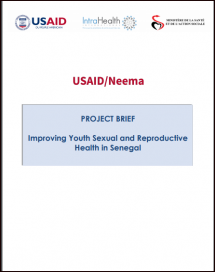Improving Youth Sexual and Reproductive Health in Senegal
Together, IntraHealth International and the Ministry of Health and Social Action in Senegal, as part of the Neema project which aims to improve health for women and children in Senegal by strengthening health services and making them accessible to more people, we identified behavioral barriers to using contraception and designed solutions to help young people make active decisions about their sexual health.
They conducted a literature review, observed nine health facilities, conducted 80 individual interviews with youth, their parents, and health workers, and conducted 11 focus groups with youth in order to identify behavioral barriers to the use of modern contraception among youth (ages 15-24).
The researchers found that young people do not form an intention to use modern methods of contraception because they:
• Believe they are protected by traditional methods
• Are overconfident in their ability to abstain
• View contraceptive users in a negative light
• Overestimate the social and health costs while underestimating the benefits of contraception
• Have a limited choice set We also found that even youth who intend to use modern methods confront barriers to follow-through, including the social risks of access (stigma) and the challenge of planning ahead for every sexual encounter.
Drawing from these insights, the team designed the Wellness Checkup, a free, private conversation with a nurse or midwife at a local health facility.
Source: Johns Hopkins Center for Communication Programs, Ideas42
Date of Publication: June 23, 2020
SIMILIAR RESOURCES
Tools
Examples
- The (re)solve Project
- Community Pathways to Improved Adolescent Sexual and Reproductive Health: A Conceptual Framework and Suggested Outcome Indicators
- Improving the Uptake and Adherence of Iron Folic Acid Supplements among Pregnant and Lactating Women
- Films about Coronavirus
- Prioritizing and Targeting SBC Investments for Youth
- Voluntary Medical Male Circumcision In-Service Communication Best Practices Guide
- Prioritizing and Targeting SBC Investments for Youth
- Engaging Men and Boys: A Brief Summary of UNFPA Experience and Lessons Learned
- Three Lessons on Sparking Behavior Change through Interpersonal Communication
- Lessons Learned from an Integrated Approach for Reaching First-time Young Parents in Nigeria
- How Can Social and Behavior Change Programming Improve Reproductive Health and Family Planning Behaviors of Out-of-School Youth in the Philipppines?
- Didier and Men in the Informal Sector: Emerging Leaning:
- Innovations Lab, Burkina Faso
- Didier - An Edutainment-based Human-Centred Design Project
- Rhythm of Life Music and Health Festival - Zambia

